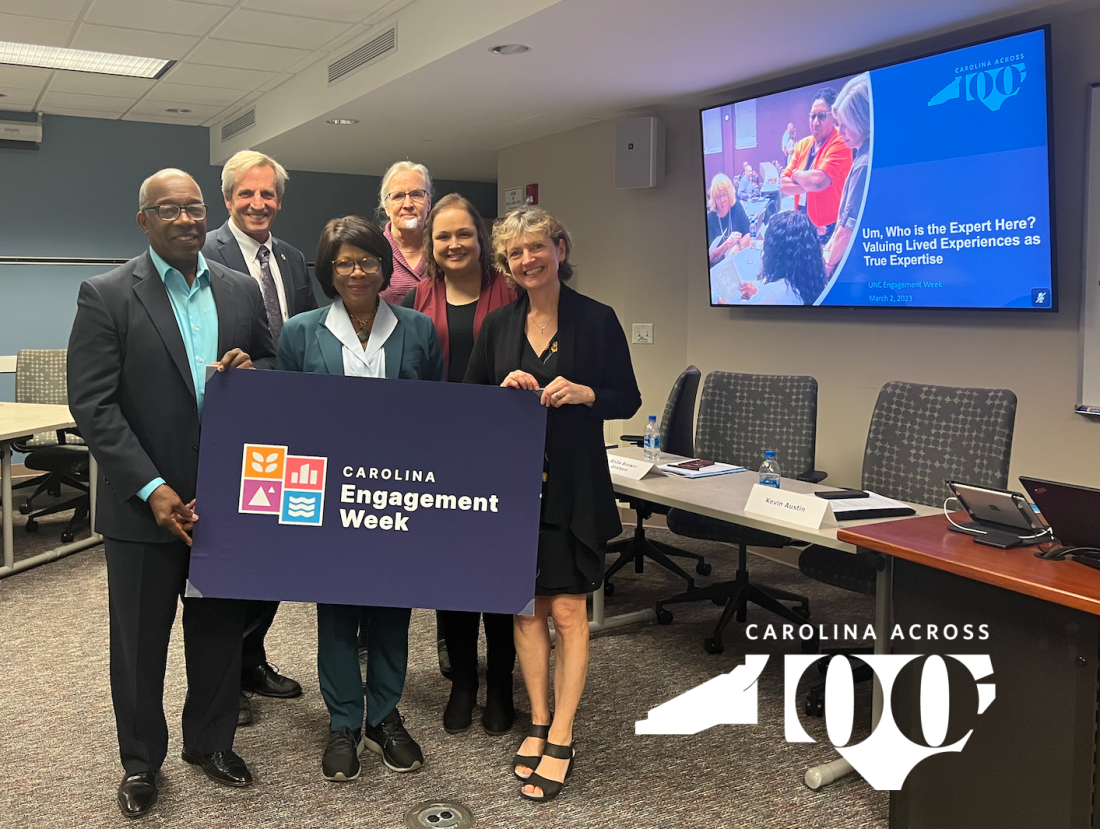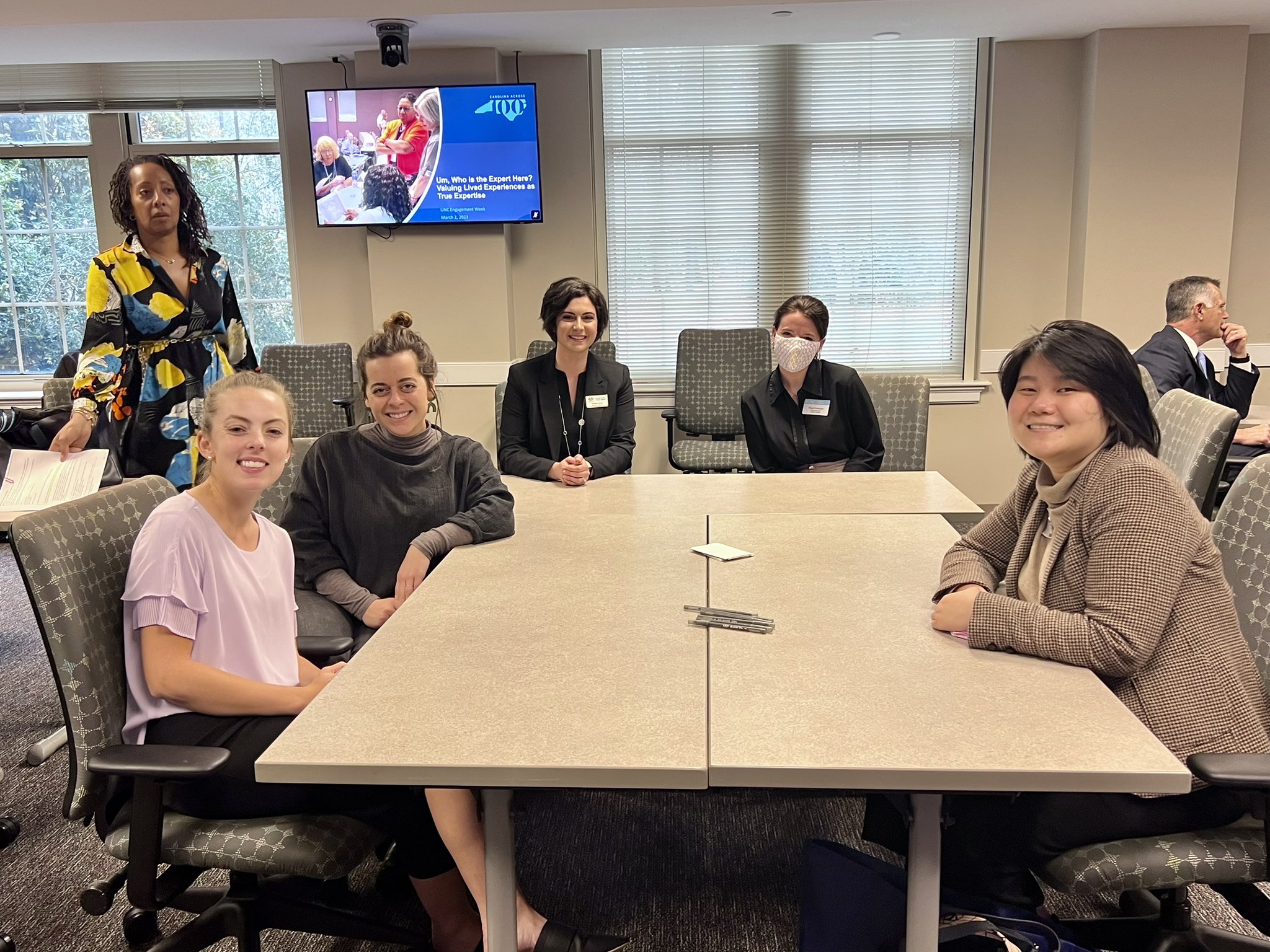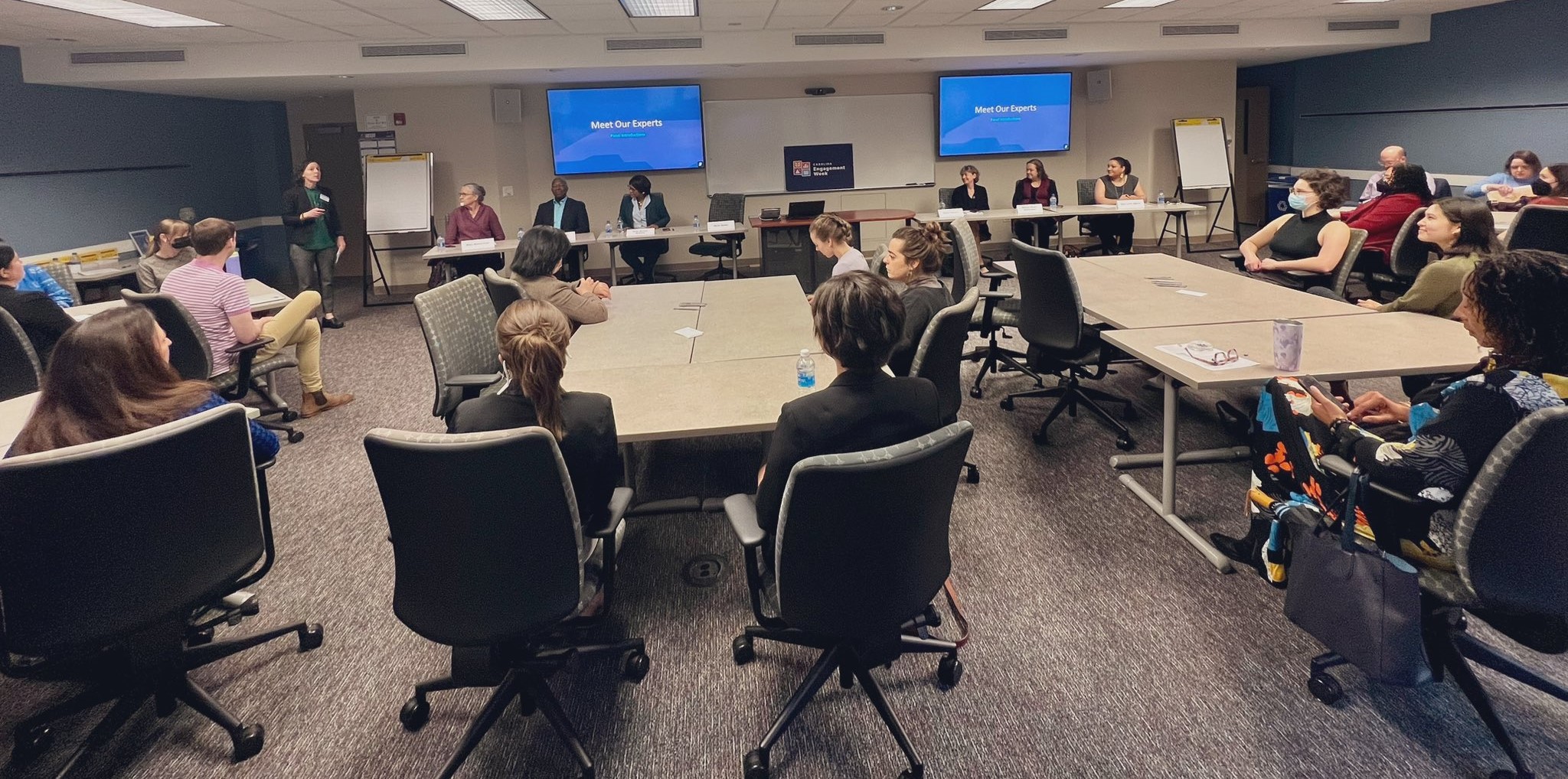Equity Challenges With Community-Campus Partnerships
Partnerships between academic and community researchers can have significant challenges. On March 2, 2023, as part of UNC Community Engagement Week, ncIMPACT Initiative and the Carolina Across 100 Initiative hosted a session, “Um, Who is the Expert Here? Valuing Lived Experiences as True Expertise,” to explore the issues.

Co-Author: Jessica Dorrance
The Problem
As academics, we often find ourselves doing deep research in communities. We approach the work armed with data, theories, and insights on evidence-based practices. Our armor is often woefully inadequate, however. We rarely come to the work fully understanding the community’s important contexts and nuances, how much of that context is molded by its long history, what motivates change in the community, and who are the best change agents. When we are smart and lucky, we partner with expert laypersons who support our work by conducting research activities in their communities. These community researchers enhance our work through their insider status and knowledge.
Partnerships between academic and community researchers can have significant challenges. On March 2, 2023, as part of UNC Community Engagement Week, ncIMPACT Initiative and the Carolina Across 100 Initiative hosted a session, “Um, Who is the Expert Here? Valuing Lived Experiences as True Expertise,” to explore the issues.
This session brought together UNC faculty and community members as panel presenters, blending their insights from existing research with that from lived experiences. The seven presenters explained why and how they partner and shared some of their greatest successes. They spoke powerfully about bringing together academic and community experts to leverage their respective strengths, co-create knowledge, and develop more effective solutions to challenges.
The session also asked attendees, who included community members, faculty, staff, and students, to contribute to the conversation by sharing their experienced challenges in community-academic partnership as well as the solutions or workarounds they use or propose using to ensure meaningful and mutually beneficial collaboration.
Consider the working definition of community-based participatory research (CBPR) between the academy and communities as summarized by the Kellogg Foundation.
CBPR is a collaborative approach to research that equitably involves all partners in the research process and recognizes the unique strengths that each brings. CBPR begins with a research topic of importance to the community with the aim of combining knowledge and action for social change to improve community health and eliminate health disparities.[1]
While the definition of CBPR makes clear its promise, so is the possibility of encountering challenges. We heard many of these from our session attendees, and the number and breadth of challenges raised underscored the complexities of successfully managing these reciprocal relationships.
Four primary themes characterized their challenges:
1) The importance of building and nurturing relationships
- Trust is a must between academic and community partners, but it can be challenging to know exactly when, where, and how to start building it
- Finding the patience and time needed to develop trusting relationships when everything is needed yesterday
2) The toll of the work on communities and community researchers
- Facing fatigue from communities that have been over-researched and just want to be left alone
- Needing to compensate communities/community members for their time and engagement
- Struggling to prioritize where to start when there are many needs in a community
3) Cultural concerns
- Confronting biases from either/both the academic and community partners
- Overcoming language barriers and/or lack of cultural competencies
- Identifying effective liaisons between academia and the community
- Representing communities accurately through images and descriptions
- Resolving a lack of flexibility and/or adaptability from the academic partner
4) Sustainability
- Engaging in ‘one-offs’ rather than building longer-term relationships
- Prioritizing the post-research phase sustainability of the work
The Response
Community researchers may be hired to conduct recruitment, enrollment, data collection, and data analysis activities in research projects.[2] Their value comes from the shared life circumstances, social settings, and common experiences with potential research participants that they bring to the work. There may be other benefits. For example, in communities where mistrust of research is deeply rooted in historical experiences, having individuals who can relate to participants, have similar backgrounds, understand participants’ experiences, and speak their language can be a necessary step toward building and maintaining trust.[3]
The payoff can be high when community researchers are effective partners. For the challenges identified above, our Engagement Week session attendees offered thoughtful solutions or workarounds based on their experiences. Here are some of the examples that surfaced:
The importance of relationships: Connect Venus and Mars
| Challenge | Solution | |
|---|---|---|
| Building trust and reciprocity between academic and community partners. |  | Break down the hierarchies. Eliminate titles. |
| Finding the patience and time needed to develop trusting relationships when everything is needed yesterday. |  | Put the community at the center. Be flexible and adaptable to community needs. |
The toll of the work for communities and community researchers: Avoid giving the side-eye. Everyone wants their contributions to be recognized.
| Challenge | Solution | |
|---|---|---|
| Facing fatigue from over-researched communities. |  | Try to build on prior work and knowledge. Engage a trusted intermediary to facilitate community building between the partners if there are significant issues. |
| Needing to compensate communities/community members for their time and engagement. |  | Find a way to affirm the value of community researchers’ time and expertise. Sometimes honorariums are easier than a salary. |
| Struggling to prioritize where to start when there are many needs in a community. |  | Listen actively to the community. Do not allow the academic voice to dominate. |
Cultural concerns: Mars and Venus, again?
| Challenge | Solution | |
|---|---|---|
| Confronting biases from either/both the academic and community partners. |  | Talk freely and frequently. Host a conversation with a third-party facilitator if needed. |
| Overcoming language barriers and/or lack of cultural competencies. |  | Seek advice from the community. |
| Identifying effective liaisons between academia and the community. |  | Be clear about the purpose and needs. |
| Representing communities accurately. |  | Seek advice from the community. |
| Resolving a lack of flexibility and/or adaptability from the academic partner. |  | Try to make it work but be authentic and upfront about what is possible (or not). |
Sustainability: Hear the people who will still be in the community when the research ends
| Challenge | Solution | |
|---|---|---|
| Confronting biases from either/both the academic and community partners. |  | Talk freely and frequently. Host a conversation with a third-party facilitator if needed. |
| Overcoming language barriers and/or lack of cultural competencies. |  | Seek advice from the community. |
| Identifying effective liaisons between academia and the community. |  | Be clear about the purpose and needs. |
| Representing communities accurately. |  | Seek advice from the community. |
| Resolving a lack of flexibility and/or adaptability from the academic partner. |  | Try to make it work but be authentic and upfront about what is possible (or not). |
Leaning into the Positive by Focusing on the Promise
The intention is to ensure the meaningful involvement of community researchers in raising questions about the research goals, giving shape to the research methods, collecting and analyzing data, identifying points for social change, and helping communities implement these changes. However, the work can be challenging for both sets of partners. To reduce the friction costs and maximize the promise of these partnerships, our UNC Community Engagement week session participants made some insightful suggestions.
Both sides must invest heavily in developing a relationship based on trust and reciprocity. Emerging tensions should be addressed immediately and free of the restraints of any power imbalance. This is not easy to do. It is about building relationships with orientations that may feel like they come from different planets. Mars and Venus? Much of the responsibility for creating the right context for trust will lie with the academic partner.
Our session attendees indicated that it is important to support community involvement in research at all levels and to aspire for research where community members contribute to each stage in the process, from conceptualizing the research aims and objectives to disseminating findings. That said, research can take an emotional toll on community researchers. Academic partners need to understand the additional cost of the work. Also, we need to find ways to compensate community researchers for their time and thought.
No trust, no change. It is that simple, and to gain trust, academic researchers must put the particular community we are researching at the center of the partnership and the work. To fully engage with a community, we must understand the pre-existing history, especially with prior researchers. We need to prioritize the need for materials or flexibility targeted to the culture(s) of the community.
Finally, our attendees noted that many community researchers join the team not for the research but for the change it will bring to the community. That means sustainability is a premium for these partners. Academic partners must work toward sustainability whenever possible and be open about limitations, especially those an outside funder or regulatory agency may impose.
There is so much more to explore in these partnerships that we just might sponsor a follow-up session during next year’s Engagement Week. Stay tuned for more about that. In the meantime, please share your thoughts here.
[1] See www.sph.umich.edu/chsp/. Kellogg Foundation definition of Community Based Participatory Research (CBPR)
https://llu.edu/academics/centers-institutes/institute-for-community-partnerships-icp/our-work/community-engaged-research/community-based-participatory-research#:~:text=The%20Kellogg%20Health%20Scholars%20Program,unique%20strengths%20that%20each%20brings.
[2] Roche B, Guta A, Flicker S. The Wellesley Institute Community Based Research Working Paper Series. 2010. Peer research in action I: Models of practice. [Google Scholar]
[3] Grady C, Hampson LA, Wallen GR, Rivera-Goba MV, Carrington KL, Mittleman BB. Exploring the Ethics of Clinical Research in an Urban Community. Am J Public Health. 2006;96:1996–2001. [PMC free article] [PubMed] [Google Scholar]


